-
ORIGINAL ARTICLE09-29-2022
Construction and validation of an instrument for classifying nipple and areola complex lesions resulting from breastfeeding
Revista Brasileira de Enfermagem. 2022;75(1):e20210051
Abstract
ORIGINAL ARTICLEConstruction and validation of an instrument for classifying nipple and areola complex lesions resulting from breastfeeding
Revista Brasileira de Enfermagem. 2022;75(1):e20210051
DOI 10.1590/0034-7167-2021-0051
Views0See moreABSTRACT
Objectives:
to construct and validate a classification of nipple and areola complex lesions resulting from breastfeeding, according to content and appearance.
Methods:
this is a methodological study, developed in four stages: operational definition, instrument construction, content and appearance validation. The Delphi technique and a Likert-type scale were used to validate content and appearance, through the participation of ten and sixteen judges, respectively. For analysis, Content Validity Index and Kappa Coefficient were applied.
Results:
Content Validity Index obtained an overall value of 0.93 and, for appearance, 0.94. Kappa values ranged between 0.46 and 1. The high rates of agreement among judges demonstrated the quality of the proposed content validity.
Conclusions:
the Nipple and Areola Complex Lesions Classification Instrument developed obtained acceptable values of its indexes, proving to be valid in terms of content and appearance.
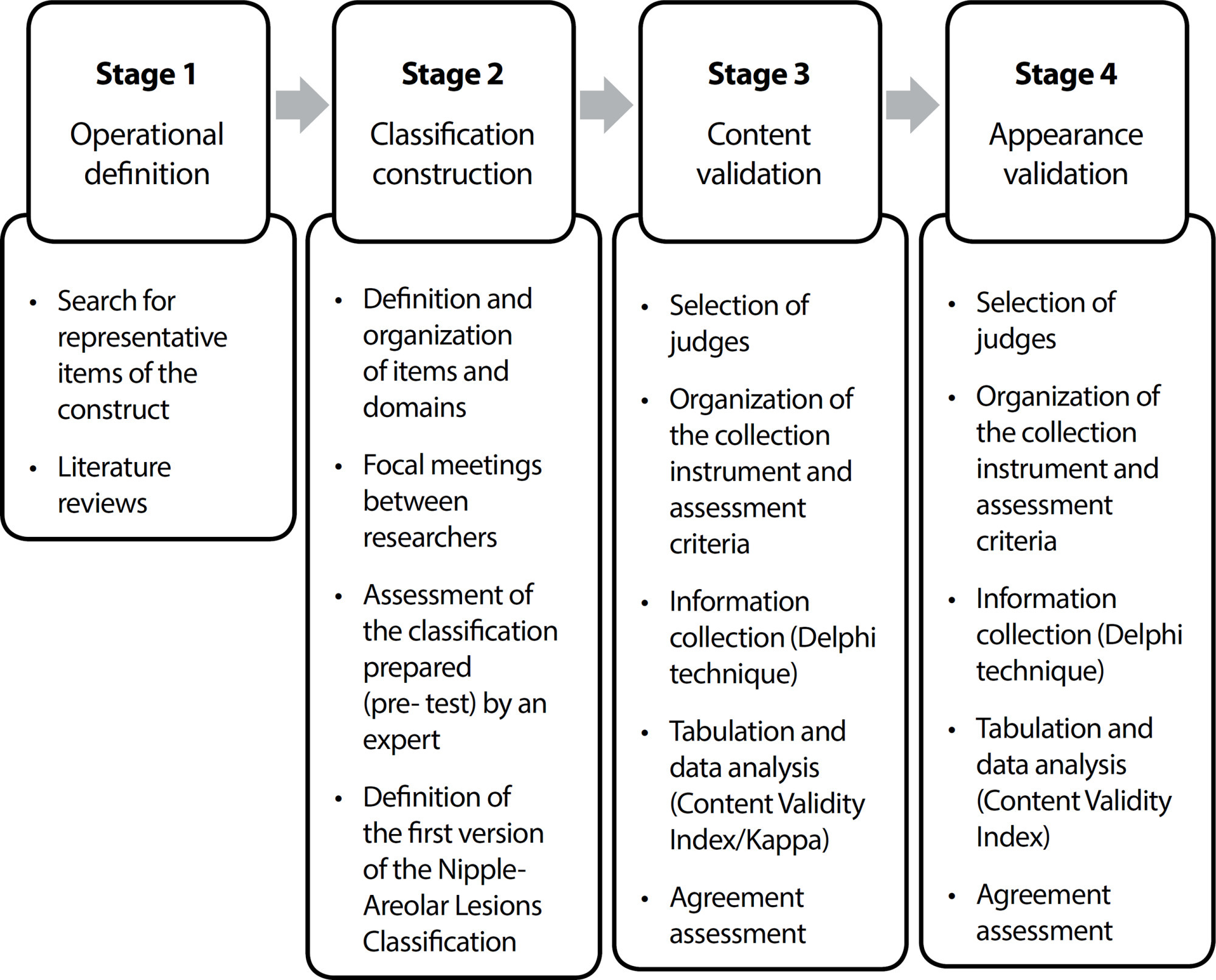
-
ORIGINAL ARTICLE09-29-2022
Incidence of acute radiodermatitis in women with breast cancer undergoing hypofractionated radiotherapy
Revista Brasileira de Enfermagem. 2022;75(1):e20210118
Abstract
ORIGINAL ARTICLEIncidence of acute radiodermatitis in women with breast cancer undergoing hypofractionated radiotherapy
Revista Brasileira de Enfermagem. 2022;75(1):e20210118
DOI 10.1590/0034-7167-2021-0118
Views0See moreABSTRACT
Objective:
To estimate the incidence and degree of acute radiodermatitis at the end and after the end of treatment in women with breast cancer undergoing hypofractionated radiotherapy.
Methods:
Observational, prospective, and longitudinal study, conducted between March 2019 and January 2020, in a radiotherapy outpatient clinic.
Results:
Thirty-two women participated in the study, among whom, in the last session of hypofractionated radiotherapy, 15 (46.9%) had radiodermatitis, erythema in 13 (40.6%), and wet peeling in 2 (6.3%). In the post-treatment evaluation, 27 (84.4%) had radiodermatitis, erythema in 17 (53.1%), dry peeling in 8 (25%), and wet peeling in 2 (6.3%).
Conclusion:
The general incidence of radiodermatitis after hypofractionated radiotherapy in women with breast cancer was 37.5%, erythema, 12.5%, and dry peeling, 25%. The development of care protocols for the management of radiodermatitis after treatment is of paramount importance.
-
ORIGINAL ARTICLE09-29-2022
Palliative care production for health professionals in the context of home care
Revista Brasileira de Enfermagem. 2022;75(1):e20210030
Abstract
ORIGINAL ARTICLEPalliative care production for health professionals in the context of home care
Revista Brasileira de Enfermagem. 2022;75(1):e20210030
DOI 10.1590/0034-7167-2021-0030
Views1See moreABSTRACT
Objectives:
to analyze palliative care production developed by health professionals to home care patients.
Methods:
this is an exploratory study, with a qualitative approach, using the transpersonal care theoretical framework. Thirteen interviews were conducted with health professionals and 18 observations were conducted on different cases. Content analysis was performed using MAXQDA©.
Results:
actions performed: maintenance and follow-up measures to people eligible for palliative care, in acts of dialogue and “listening” to caregivers and users, conducting guidelines for the care and self-care process, performing technical procedures, delivery of materials, referrals and medical prescriptions to users.
Final Considerations:
it is perceived the need for advances in the implementation of government policies in Brazil that insert palliative care into the Health Care Network through educational, managerial and care actions that ensure human dignity, thus allowing the development of these and other palliative care interventions.
-
REVIEW09-29-2022
Children with congenital heart disease in COVID-19 pandemic times: an integrative review
Revista Brasileira de Enfermagem. 2022;75(1):e20201033
Abstract
REVIEWChildren with congenital heart disease in COVID-19 pandemic times: an integrative review
Revista Brasileira de Enfermagem. 2022;75(1):e20201033
DOI 10.1590/0034-7167-2020-1033
Views0See moreABSTRACT
Objective:
to identify the scientific production in health about children with congenital heart disease in COVID-19 pandemic times.
Method:
this is an integrative review, carried out in June 2020 in the information resources Latin American and Caribbean Literature in Health Sciences (LILACS), National Library of Medicine, National Institutes of Health (PubMed), Scientific Electronic Library Online Journal Portal (SciELO) and Brazilian Institute of Information Science and Technology (Oasis Ibict).
Results:
14 studies composed this review. Most studies pointed to tests, interventional procedures and surgery for children with heart disease in pandemic times; others discussed possible complications of COVID-19 among children with congenital heart disease.
Conclusion:
the incipient production of studies and the weak level of evidence denote an important knowledge gap so far, highlighting the need for studies with strong scientific evidence for the formulation of care guidelines aimed at children with heart disease.
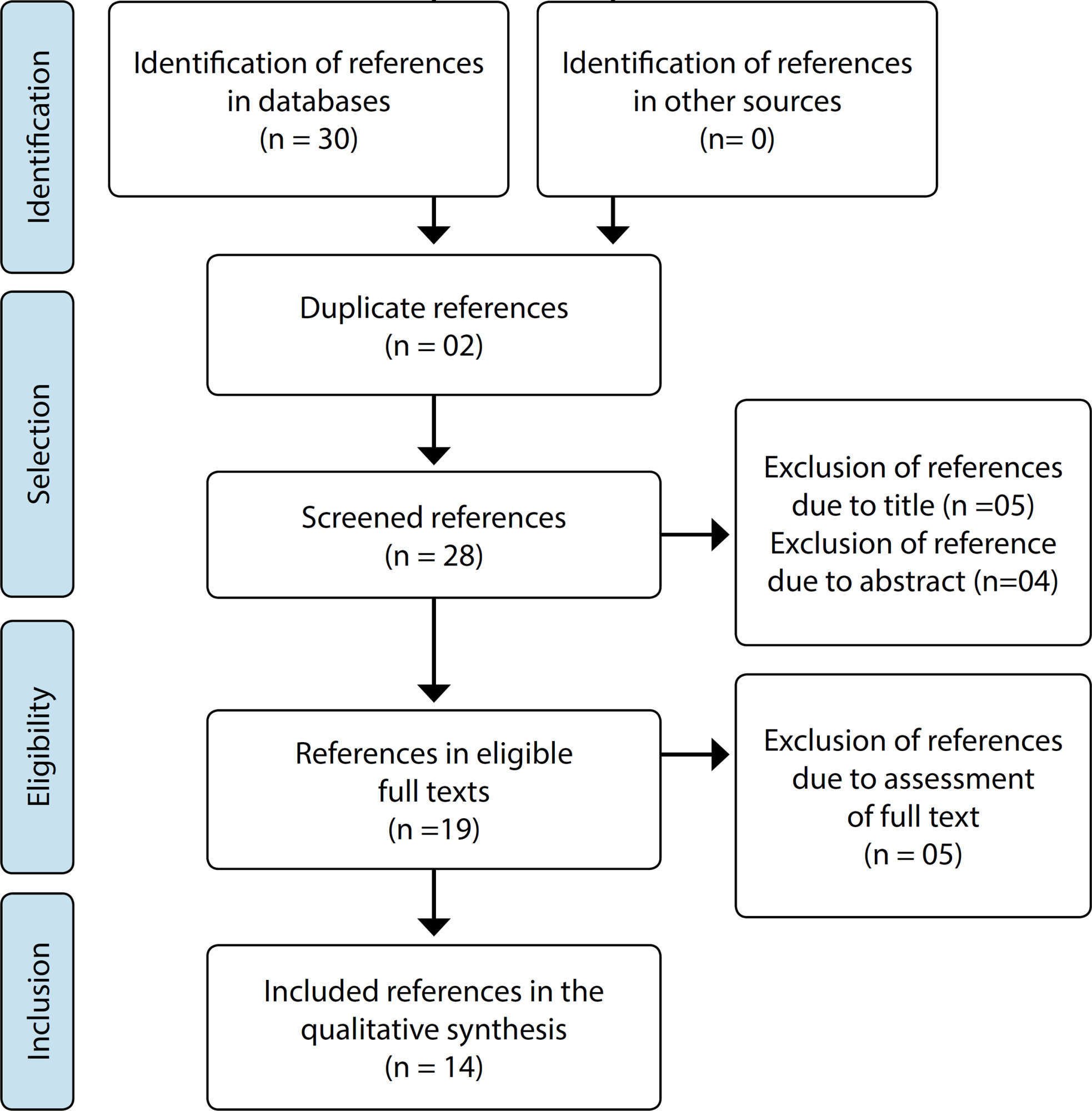
-
REVIEW09-29-2022
Nursing students’ learning from involvement in research projects: an integrative literature review
Revista Brasileira de Enfermagem. 2022;75(1):e20210053
Abstract
REVIEWNursing students’ learning from involvement in research projects: an integrative literature review
Revista Brasileira de Enfermagem. 2022;75(1):e20210053
DOI 10.1590/0034-7167-2021-0053
Views0See moreABSTRACT
Objective:
To identify the learning outcomes and skills obtained of undergraduate nursing students involved in research projects.
Methods:
This was an integrative literature review, based on a research protocol in the CINAHL Complete databases; Cochrane Central Register of Controlled Trials; Cochrane Database of Systematic Reviews; Cochrane Methodology Register; MedicLatina; MEDLINE, Scopus and JBI, including primary and secondary studies, published between 2015 and 2020.
Results:
A total of five heterogeneous articles were included, which were categorized using Kirkpatrick’s (adapted) model. Seventeen learning outcomes acquired through participation in research projects were identified, from the learning of new knowledge and skills to the development of new attitudes and behaviors.
Final considerations:
The involvement of nursing students in research projects is important to their professional development. Future investment in research on this topic can help cement the potential of this type of student involvement.
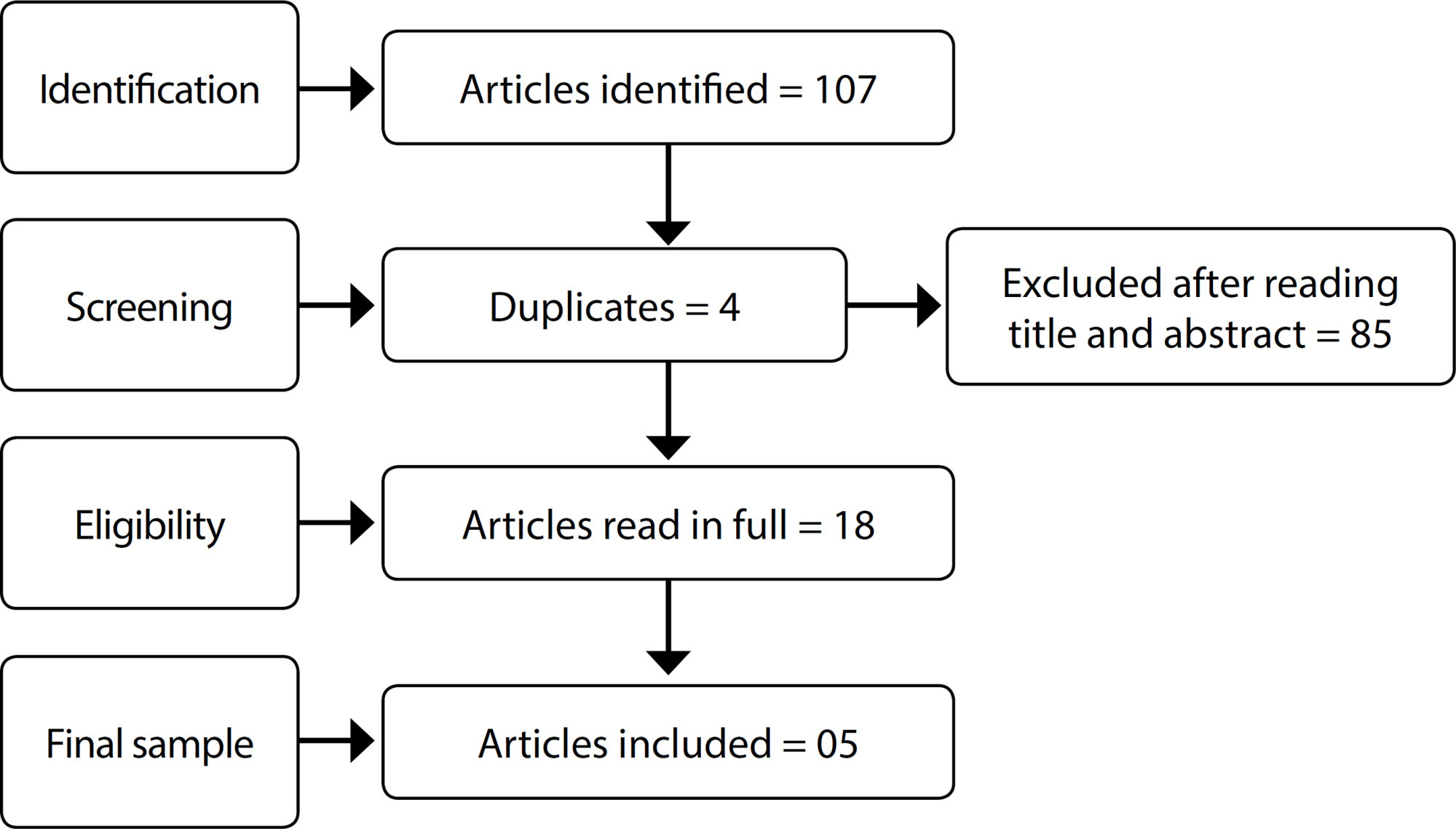
-
ORIGINAL ARTICLE09-29-2022
The presence of anemia in patients with leg ulcer: laboratory test
Revista Brasileira de Enfermagem. 2022;75(1):e20210064
Abstract
ORIGINAL ARTICLEThe presence of anemia in patients with leg ulcer: laboratory test
Revista Brasileira de Enfermagem. 2022;75(1):e20210064
DOI 10.1590/0034-7167-2021-0064
Views0See moreABSTRACT
Objective:
To evaluate the presence of anemia in patients with chronic lower limb ulcers based on profile and hematometric indices.
Method:
This is a cross-sectional study carried out in a university hospital in Rio de Janeiro. The sample was composed of 64 participants with lower limb ulcers and evolution time greater than 12 weeks. Data was collected between May/2016 and December/2017 from hematological analyses, records from medical records, and wound assessment form.
Results:
36 (56.2%) were male; 38 (59.4%) between 60 and 80 years old; 56 (87.5%) with chronic diseases and 52 (81.2%) with venous ulcers. 6 years mean of active ulceration. Anemia was detected in 36 (56.2%), 27 (75%) of which were normochromic and normocytic; 14 (38.8%) had deficiency anemia recorded in their medical chart.
Conclusion:
The low hemoglobin concentration is recurrent among the participants characterizing an anemia condition, whose profile reveals congruence to the anemia of chronic disease.
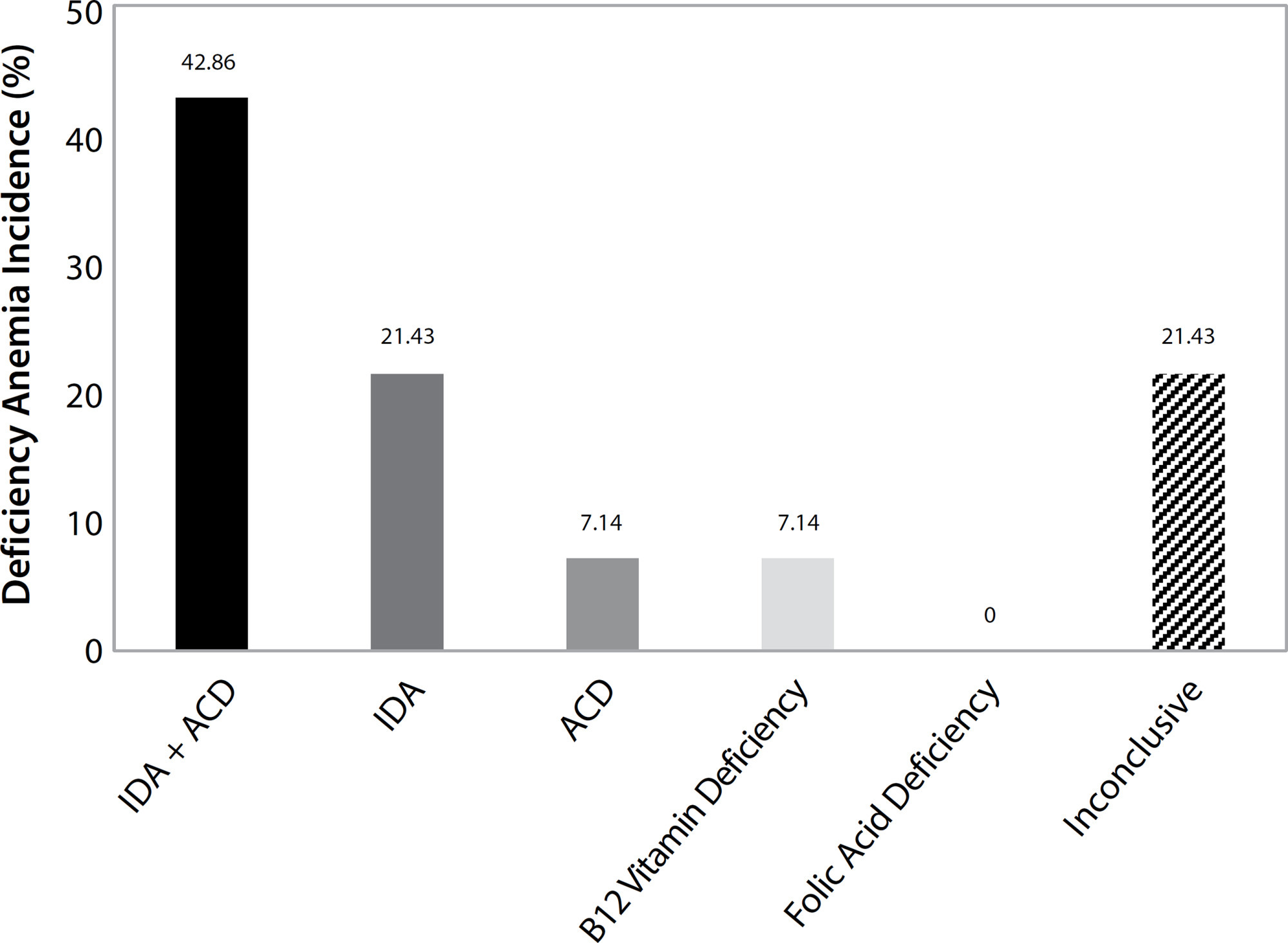
-
ORIGINAL ARTICLE09-29-2022
Hand hygiene determinants of informal caregivers in hospitals under Pender’s perspective
Revista Brasileira de Enfermagem. 2022;75(1):e20210012
Abstract
ORIGINAL ARTICLEHand hygiene determinants of informal caregivers in hospitals under Pender’s perspective
Revista Brasileira de Enfermagem. 2022;75(1):e20210012
DOI 10.1590/0034-7167-2021-0012
Views0See moreABSTRACT
Objectives:
to analyze hand hygiene determinants of informal caregivers in a hospital environment.
Methods:
qualitative study conducted with 55 caregivers at a university hospital in the Northeast of Brazil. A semi-structured instrument was used, adapted from Nola Pender’s Health Promotion Model, from which the deductive categories were derived.
Results:
the general behavior included hand hygiene before meals and after using the bathroom. Sensitivity to the requirements for hand hygiene was observed, but the barriers and self-efficacy consisted of the availability of soap or alcohol-based hand sanitizers, the lack of knowledge on the importance of and forgetfulness of the practice. The reinforcement on the importance of the practice and being in a contaminated environment were influencers, and commitment, warnings, and training were indispensable.
Conclusions:
benefits related to protection from infections were seen as positive determinants for hand hygiene adherence. For non-adherence, factors such as lack of sanitizing supplies, ignorance towards the importance of the activity, and forgetfulness stood out.
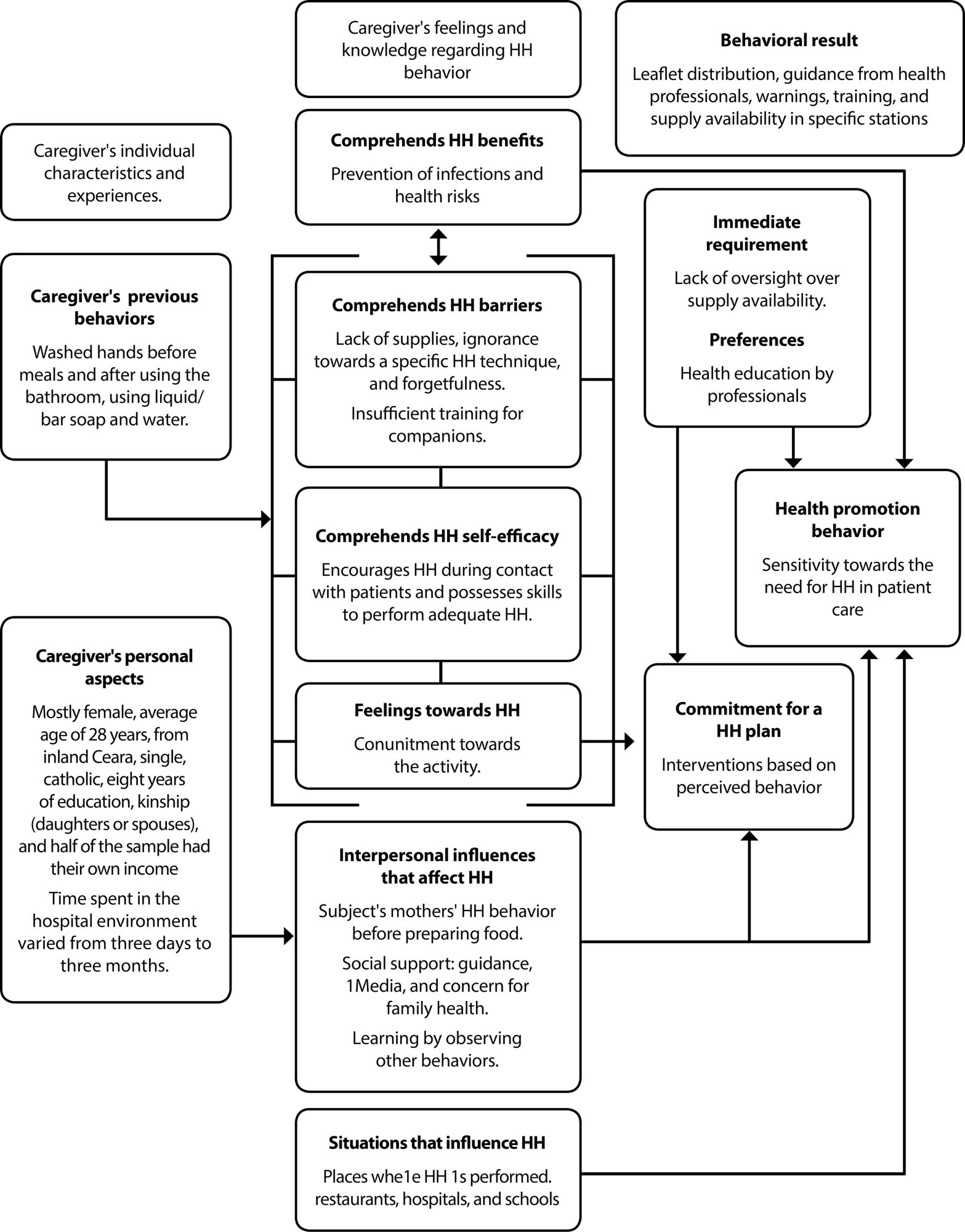
-
ORIGINAL ARTICLE09-29-2022
Effects of sexuality on frailty and quality of life in the elderly: a cross-sectional study
Revista Brasileira de Enfermagem. 2022;75(1):e20210049
Abstract
ORIGINAL ARTICLEEffects of sexuality on frailty and quality of life in the elderly: a cross-sectional study
Revista Brasileira de Enfermagem. 2022;75(1):e20210049
DOI 10.1590/0034-7167-2021-0049
Views0See moreABSTRACT
Objectives:
to analyze the effects of sexuality on frailty and quality of life in the elderly.
Methods:
a sectional study conducted with 662 elderly people between July and October 2020. Four self-administered instruments were used to collect bio-sociodemographic variables, sexuality, frailty and quality of life. Correlation analysis and structural equation modeling were performed.
Results:
among the dimensions that assess sexuality, sexual intercourse had a weak, positive effect on quality of life (SC: 0.134, 95%CI: 0.153 – 0.254, p = 0.027), while affective relationships had a strong, positive effect (SC: 0.556, 95%CI: 0.442 – 0.670, p < 0.001). Frailty was only significantly related to a weak to moderate negative effect with sexual intercourse (SC: -0.216, 95%CI: -0.385 - -0.047, p = 0.012).
Conclusions:
two dimensions of sexuality, Sexual intercourse and Affective relationships, were found to have an effect on the quality of life and frailty of the elderly people investigated.
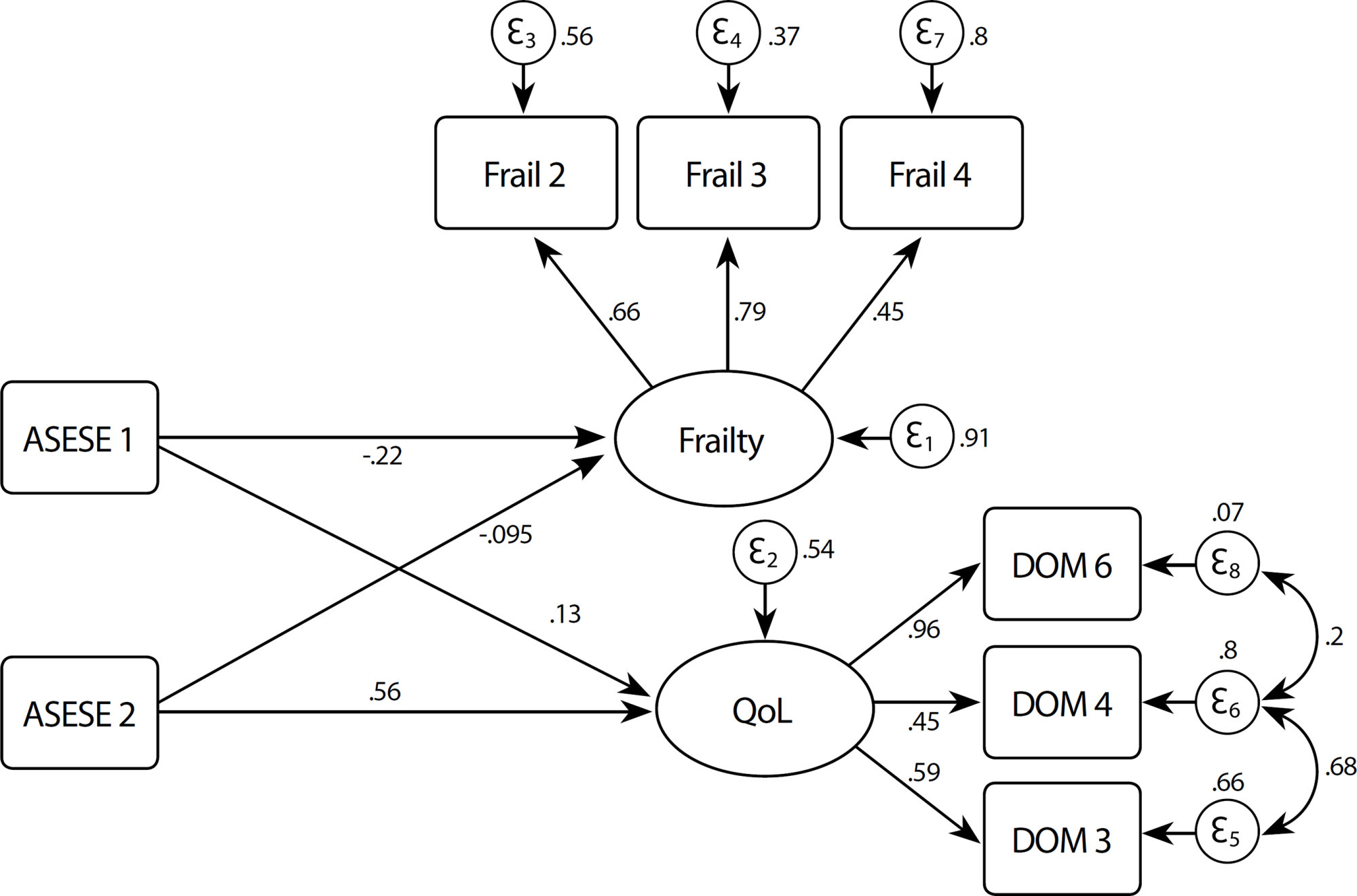
-
ORIGINAL ARTICLE01-01-2019
The Brazilian Army nurses’ uniforms: visual identity in World War II
Revista Brasileira de Enfermagem. 2019;72(1):111-117
Abstract
ORIGINAL ARTICLEThe Brazilian Army nurses’ uniforms: visual identity in World War II
Revista Brasileira de Enfermagem. 2019;72(1):111-117
DOI 10.1590/0034-7167-2018-0414
Views1See moreABSTRACT
Objective:
To analyze the symbolic effects of the official military uniform of the nurses from Brazilian Army in World War II.
Method:
This research was developed using the historical method, with iconographic sources. The data were discussed based on the concepts of the social world theory, by Pierre Bourdieu.
Results:
The images selected demonstrate the own meaning of the uniforms, evidencing the functions and the social position of those who wear it, being private and obligatory to use it in the military field.
Final considerations:
In the case of the nurses from the Brazilian Expeditionary Force, the appropriation of uniforms promoted the visual communication representing military nurse in the context of war, at the same time it served for distinction purposes in the army, but not necessarily in the nursing field. Symbolically, they remained amongst the walls of the barracks even after the end of the war and, thus, they remained unknown and marked by the symbols of forgetfulness.

-
REFLECTION01-01-2019
The concept of vulnerability applied to Healthcare-associated Infections
Revista Brasileira de Enfermagem. 2019;72(1):299-303
Abstract
REFLECTIONThe concept of vulnerability applied to Healthcare-associated Infections
Revista Brasileira de Enfermagem. 2019;72(1):299-303
DOI 10.1590/0034-7167-2017-0584
Views1See moreABSTRACT
Objective:
To discuss the potentialities of using the concept of vulnerability to support measures for preventing and controlling healthcare-associated infections (HAIs).
Methods:
This theoretical study was conducted in steps: 1) presentation of markers that frame the concept of vulnerability; 2) presentation of the characteristics of the health events to which the concept of vulnerability is intended to be applied; 3) identification of research gaps that could be potentially filled by using the concept of vulnerability; 4) identification of the potentialities of using the concept of vulnerability to deal with HAIs.
Results:
Proposal of a framework for analyzing HAIs from a vulnerability perspective, including the individual and collective dimensions.
Conclusion:
Using the concept of vulnerability to study and deal with HAIs favors a new approach to an old problem, unlike the dominant studies that highlight the individual aspects of the practices in healthcare services.
-
REFLECTION01-01-2019
Operationality of concepts in Heideggerian phenomenological investigation: epistemological reflection on Nursing
Revista Brasileira de Enfermagem. 2019;72(1):304-308
Abstract
REFLECTIONOperationality of concepts in Heideggerian phenomenological investigation: epistemological reflection on Nursing
Revista Brasileira de Enfermagem. 2019;72(1):304-308
DOI 10.1590/0034-7167-2017-0941
Views1See moreABSTRACT
Objective:
To describe the investigative path of analysis and the operationality of concepts based on Martin Heidegger’s theoretical and philosophical framework.
Method:
Theoretical reflection on the phenomenon of pregnancy in a woman with heart disease.
Results:
Stages of the investigative movement were evidenced based on the pre-reflection related to the object of study and to the search for the phenomenal meaning, using the existential and analytical Hermeneutics as the approach and resulting in the reach of the phenomenal totality.
Conclusion:
The worldview of the researcher, who considered the subjectivities of the person in a health or disease situation, favored the announcement of the referential by the object of study. Knowledge production in the light of Martin Heidegger’s phenomenology unveiled phenomena lived and experienced in the Health and Nursing field, provided of epistemological rigor that demanded appropriation of concepts inherent to the existential analytics.

-
ORIGINAL ARTICLE04-18-2019
Teaching-service integration: building the educational workshop in healthcare
Revista Brasileira de Enfermagem. 2019;72(2):375-382
Abstract
ORIGINAL ARTICLETeaching-service integration: building the educational workshop in healthcare
Revista Brasileira de Enfermagem. 2019;72(2):375-382
DOI 10.1590/0034-7167-2018-0008
Views0See moreABSTRACT
Objective:
To identify the pedagogical strategies and the elements that determine the construction of the educational workshop in healthcare at the teaching-service integration process.
Method:
Collective case study with qualitative approach. The cases consisted of two undergraduate courses in nursing. Thirty-one interviews were conducted with healthcare professionals, professors and students, in addition to participant observation in seven basic health units (UBS) that received the students interviewed.
Results:
The following analytical categories emerged: teaching-service integration: articulating idealized situations with real situations; pedagogical workshop in health: development of collective pedagogical actions; reflection on the experiences in the pedagogical workshop in health: articulating the knowledge of the work world with the teaching world.
Final Consideration:
Despite the integration difficulties between teaching and service, we can conclude that their encounter generates a fertile field for the development of the educational workshop in healthcare. To this end, the agreement of the strategies presented in the constitution of the workshop is necessary.

-
ORIGINAL ARTICLE06-27-2019
Collective construction of bundle for immunobiological agents conservation best practices
Revista Brasileira de Enfermagem. 2019;72(3):671-679
Abstract
ORIGINAL ARTICLECollective construction of bundle for immunobiological agents conservation best practices
Revista Brasileira de Enfermagem. 2019;72(3):671-679
DOI 10.1590/0034-7167-2018-0406
Views0See moreABSTRACT
Objective:
to construct collectively with nursing professionals bundle for best practices of cold chain maintenance of immunobiological agents conservation at the local level.
Method:
a qualitative research of convergent care type. Bundle construction was guided by the Evidence-Based Practice criterion. Data collection was carried out from October to December 2016, through five workshops, with the participation of 21 professionals from 7 vaccination rooms of a municipality of Minas Gerais State. The framework developed by Morse and Field was adopted for data analysis.
Results:
through bundle, care is taken regarding refrigeration equipment temperature monitoring, contingency plan performance, recyclable ice coil setting and chamber use as refrigeration equipment.
Final considerations:
the chosen interventions began to guide the practice and promote a care based on safety and quality.
-
ORIGINAL ARTICLE09-16-2019
Management of nursing care in HIV/AIDS from a palliative and hospital perspective
Revista Brasileira de Enfermagem. 2019;72(5):1243-1250
Abstract
ORIGINAL ARTICLEManagement of nursing care in HIV/AIDS from a palliative and hospital perspective
Revista Brasileira de Enfermagem. 2019;72(5):1243-1250
DOI 10.1590/0034-7167-2017-0431
Views2See moreABSTRACT
Objectives:
To understand the meaning attributed by the nurse to the management of nursing care to the person hospitalized due to clinical complications caused by AIDS; to analyze actions related to palliative care; and to construct a theoretical matrix regarding the management of nursing care.
Method:
Qualitative, exploratory research, guided by the Grounded Theory. Seven nurses and ten nursing technicians were interviewed between May and September 2015, in a university hospital, located in Rio de Janeiro State, Brazil.
Results:
Five categories that covered the profile of the hospitalized person, palliative care, intervening conditions for care management, the need for professional qualification, and other aspects to better organize and manage care, including conflict management arose.
Final considerations:
The theoretical matrix values the quality of life, the need to understand the flow of care to avoid readmissions and not adherence to medications, requiring new research in the area, such as implementation.
-
ORIGINAL ARTICLE03-19-2021
Mobile application of the Terminology Subset for Coping with Domestic Violence Against Children
Revista Brasileira de Enfermagem. 2021;74:e20200287
Abstract
ORIGINAL ARTICLEMobile application of the Terminology Subset for Coping with Domestic Violence Against Children
Revista Brasileira de Enfermagem. 2021;74:e20200287
DOI 10.1590/0034-7167-2020-0287
Views1See moreABSTRACT
Objective:
to describe the development of a mobile application for the International Classification Terminology Subset for Nursing Practice for Coping with Domestic Violence Against Children.
Methods:
an applied research of technological development, based on the Analysis, Design, Development, Implementation and Evaluation model and on the terminological subset based on the Theory of Nursing Praxis Intervention in Collective Health framework.
Results:
the application is divided into: 1) “Definition”: characterizes the phenomenon of violence against children; 2) “Assistance”: electronic record of nursing care; 3) “Diagnosis Consultation”; 4) “Intervention Consultation”: nursing diagnoses, outcomes, and interventions related to children and their families, subdivided into Strengthening and Weariness group.
Final considerations:
built from scientific research, the application has the potential to support nursing care, presenting, in an organized and systematic manner, nursing diagnoses, outcomes, and interventions, in addition to enabling the registration of cases under monitoring.

-
ORIGINAL ARTICLE09-05-2022
Spirituality and religiosity expressed by relatives of drug users: contributions to health care
Revista Brasileira de Enfermagem. 2022;75:e20210724
Abstract
ORIGINAL ARTICLESpirituality and religiosity expressed by relatives of drug users: contributions to health care
Revista Brasileira de Enfermagem. 2022;75:e20210724
DOI 10.1590/0034-7167-2021-0724
Views0See moreABSTRACT
Objective:
to analyze the expressions of spirituality and religiosity of relatives of people who abuse or are dependent on psychoactive substances.
Methods:
exploratory-descriptive research that dialogues with the spirituality and religiosity conceptual framework. It was performed at an outpatient clinic specialized in drug treatment in southern Brazil. Semi-structured interviews conducted with 11 relatives of patients undergoing treatment were analyzed by content analysis.
Results:
the findings were grouped into two categories: forms of expression of spirituality and religiosity practices; and their influence on relatives’ lives. Spirituality and religiosity almost always serve as a protective factor against feelings of anguish, conflicts and loneliness.
Final considerations:
despite the important role of expressions of spirituality and religiosity for many relatives, not everyone seems to benefit from them. Health professionals should consider these expressions in the construction of comprehensive health care for relatives.
-
ORIGINAL ARTICLE04-09-2020
High-risk areas of leprosy in Brazil between 2001-2015
Revista Brasileira de Enfermagem. 2020;73(3):e20180583
Abstract
ORIGINAL ARTICLEHigh-risk areas of leprosy in Brazil between 2001-2015
Revista Brasileira de Enfermagem. 2020;73(3):e20180583
DOI 10.1590/0034-7167-2018-0583
Views0See moreABSTRACT
Objectives:
to identify high-risk areas of leprosy in Brazil from 2001 to 2015.
Methods:
this is an ecological study of spatial analysis based on Brazilian municipalities. Spatial scan statistics were used to identify spatial clustering and measure the relative risk from the annual detection rate of new cases of leprosy. By criterion based on the Gini index, only secondary clusters were considered.
Results:
spatial scan statistics detected 26 clusters, in which the detection rate was 59.19 cases per 100 thousand inhabitants, while in the remainder of the country it was 11.76. Large part of the cluster area is located in the Legal Amazon. These groups included only 21.34% of the total population, but 60.40% of the new cases of the disease.
Conclusions:
Leprosy remains concentrated in some areas, showing the need for control programs to intensify actions in these municipalities.

-
REVIEW04-16-2021
Clinical outcomes of patient navigation performed by nurses in the oncology setting: an integrative review
Revista Brasileira de Enfermagem. 2021;74(2):e20190804
Abstract
REVIEWClinical outcomes of patient navigation performed by nurses in the oncology setting: an integrative review
Revista Brasileira de Enfermagem. 2021;74(2):e20190804
DOI 10.1590/0034-7167-2019-0804
Views0See moreABSTRACT
Objective:
to evidence the clinical outcomes of navigation performed by nurses in cancer patients.
Methods:
this is an integrative literature review with collection in MEDLINE via PUBMED, LILACS, Web of Science, Scopus, and CINAHL databases. The final sample consisted of seven studies. The data were analyzed and presented descriptively. Data related to clinical outcomes were compiled and described in full. The Agency for Healthcare Research and Quality categorization was used to assess the level of evidence.
Results:
the clinical outcomes demonstrated were decreased distress, anxiety and depression, improved control and management of symptoms, improved physical conditioning, improved quality and continuity of care, improved quality of life, reduced time to start treatment.
Final considerations:
there is research that shows better clinical outcomes in cancer patients through navigation by nurses across the continuum of health care.

-
ORIGINAL ARTICLE12-13-2019
Perceptions and expectations of pregnant women about the type of birth
Revista Brasileira de Enfermagem. 2019;72:41-49
Abstract
ORIGINAL ARTICLEPerceptions and expectations of pregnant women about the type of birth
Revista Brasileira de Enfermagem. 2019;72:41-49
DOI 10.1590/0034-7167-2017-0731
Views0See moreABSTRACT
Objective:
to understand the perceptions and expectations of pregnant women about the type of birth.
Method:
this is a qualitative research, based on the assumptions of the Humanization of Obstetric Care. 15 pregnant women were interviewed twice at the beginning and the end of gestation between October 2015 and May 2016. Data were analyzed according to the method of the Discourse of the Collective Subject.
Results:
the discourses were associated with four themes: Advantages of vaginal birth over cesarean section; Fear and unpredictability of vaginal birth; Importance of the doctor in the definition of the type of birth; and Influence of family and friends in choosing the type of birth.
Final considerations:
according to pregnant women, vaginal birth has more benefit compared to cesarean section. However, during gestation and birth, fear of pain and the unexpected, and medical opinions of friends and family against vaginal birth strongly influence the choice of cesarean section.
-
REVIEW09-30-2020
Telenursing in care, education and management in Latin America and the Caribbean: an integrative review
Revista Brasileira de Enfermagem. 2020;73:e20190317
Abstract
REVIEWTelenursing in care, education and management in Latin America and the Caribbean: an integrative review
Revista Brasileira de Enfermagem. 2020;73:e20190317
DOI 10.1590/0034-7167-2019-0317
Views0See moreABSTRACT
Objective:
Analyze the knowledge generated about telenursing related to the roles of nurses (care, education and management) in Latin America and the Caribbean, based on scientific evidence.
Methods:
Integrative review, for the years 2009 to 2019, in scientific databases from Latin America and the Caribbean. Twelve articles were selected.
Results:
Nine studies focused on care and three on education. The information and communication technology used in the studies was telephony directed toward non-communicable diseases. There were concerns about the remote communication process. With respect to education, two focused on educating health teams and one on educating patients.
Conclusion:
It is necessary to conduct studies on telenursing that generate changes in care practices, explore information and communication technology resources and provide communication training focused on this new care model.

-
REVIEW08-14-2020
Nursing practice environment in Primary Health Care: a scoping review
Revista Brasileira de Enfermagem. 2020;73(6):e20190479
Abstract
REVIEWNursing practice environment in Primary Health Care: a scoping review
Revista Brasileira de Enfermagem. 2020;73(6):e20190479
DOI 10.1590/0034-7167-2019-0479
Views0INTRODUCTIONKnowledge and scientific evidence about nursing practice environments (NPE) in the context of Primary Health Care (PHC) is scarce.Policy makers, health and professional organizations have proposed to redesign the health system in PHC with the aim of increasing citizens’ accessibility, improving customer outcomes and maximizing efficiency. […]See more
-
ORIGINAL ARTICLE08-19-2019
Interruptions and nursing workload during medication administration process
Revista Brasileira de Enfermagem. 2019;72(4):1001-1006
Abstract
ORIGINAL ARTICLEInterruptions and nursing workload during medication administration process
Revista Brasileira de Enfermagem. 2019;72(4):1001-1006
DOI 10.1590/0034-7167-2018-0680
Views0See moreABSTRACT
Objective:
To investigate the sources and causes of interruptions during the medication administration process performed by a nursing team and measure its frequency, duration and impact on the team’s workload.
Métodos:
This is an observational study that timed 121 medication rounds (preparation, administration and documentation) performed by 15 nurses and nine nursing technicians in a Neonatal Intensive Care Unit in the countryside of the state of São Paulo.
Resultados:
63 (52.1%) interruptions were observed. In each round, the number of interruptions that happened ranged from 1-7, for 127 in total; these occurred mainly during the preparation phase, 97 (76.4%). The main interruption sources were: nursing staff – 48 (37.8%) − and self-interruptions – 29 (22.8%). The main causes were: information exchanges – 54 (42.5%) − and parallel conversations – 28 (22%). The increase in the mean time ranged from 53.7 to 64.3% (preparation) and from 18.3 to 19.2% (administration) – p≤0.05.
Conclusão:
Interruptions in the medication process are frequent, interfere in the workload of the nursing team and may reflect on the safety of care.
-
ORIGINAL ARTICLE06-29-2020
Personal Protective Equipment in the coronavirus pandemic: training with Rapid Cycle Deliberate Practice
Revista Brasileira de Enfermagem. 2020;73:e20200303
Abstract
ORIGINAL ARTICLEPersonal Protective Equipment in the coronavirus pandemic: training with Rapid Cycle Deliberate Practice
Revista Brasileira de Enfermagem. 2020;73:e20200303
DOI 10.1590/0034-7167-2020-0303
Views0See moreABSTRACT
Objective:
to discuss the application of Rapid Cycle Deliberate Practice for attire and unattire training in the context of COVID-19 and structure a practical guide to the application at this juncture.
Methods:
this methodological study described theoretical and practical aspects of the application of a simulation strategy as a technological training tool. An application guide was constructed from the search for evidence from the main health authority bodies in Brazil.
Results:
maximizing time in Deliberate Practice, feedback with evidence and psychological security are the principles of this strategy. The dynamic involves repetition and feedback. The application guide presents the sequence of actions for attire and unattire.
Final considerations:
coping with this pandemic requires appropriate use of personal protective equipment. The authors suggest the Rapid Cycle Deliberate Practice as a technological educational tool for attire/unattire, since it encourages mastery performance.

-
REVIEW06-11-2021
Mental health interventions implemented in the COVID-19 pandemic: what is the evidence?
Revista Brasileira de Enfermagem. 2021;74:e20200635
Abstract
REVIEWMental health interventions implemented in the COVID-19 pandemic: what is the evidence?
Revista Brasileira de Enfermagem. 2021;74:e20200635
DOI 10.1590/0034-7167-2020-0635
Views0See moreABSTRACT
Objective:
to map the evidence on mental health interventions implemented during the COVID-19 pandemic.
Method:
this scoping review was carried out in the MEDLINE/PubMed, SCOPUS, Web of Science, PsycINFO, and Science Direct databases and in the medRxiv, bioRxiv, and PsyArXiv preprints servers using the descriptors “Covid-19”, “coronavirus infection”, “coronavirus”, “2019-nCoV”, “2019 novel coronavirus disease”, “SARS-CoV-2”, “health personnel”, “general public”, and “mental health”.
Results:
eight articles were selected and categorized into mental health interventions for the population, among which mental health interventions were for people diagnosed with suspicion/confirmed COVID-19 and mental health interventions for health professionals.
Conclusion:
telemonitoring, virtual games and strategies focused on social support and muscle relaxation techniques, characterized as non-pharmacological and low-cost, were shown as interventions, which, since they are effective, need to be encouraged and included in mental health care practices.

Search
Search in:
Nuvem de Tags
Adolescente (85) Atenção Primária à Saúde (239) COVID-19 (91) Criança (91) Cuidados de Enfermagem (269) Educação em Enfermagem (151) Educação em Saúde (139) Enfermagem (930) Enfermagem Pediátrica (86) Estudantes de Enfermagem (77) Estudos de Validação (131) Família (87) Idoso (208) Promoção da Saúde (99) Qualidade de Vida (104) Saúde do Trabalhador (86) Saúde Mental (145) Saúde Pública (82) Segurança do Paciente (150) Tecnologia Educacional (100)



